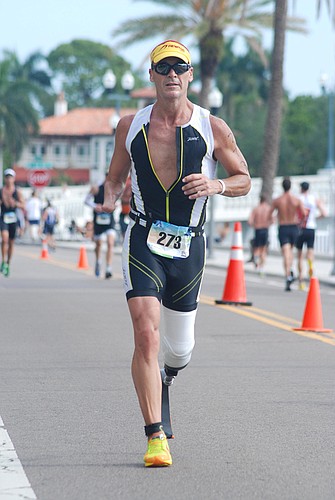- November 25, 2024
-
-
Loading

Loading

Executive: Jason Gunter, 47
Fitness passion: Ironman triathlons
Career: Owner of Jason L. Gunter, PA, Fort Myers
Why he does it: A double amputee, Gunter earned the opportunity to compete in the Ironman World Championship in Kona, Hawaii, by lottery in 2009. But he collapsed three miles from the finish line. “My dream is to get back to Kona,” says the Fort Myers lawyer. “It's a chapter that's got to be closed.” The obstacle is that no physically challenged athlete has been able to qualify against able-bodied people for a spot at Ironman Kona — yet.
How he got started: Gunter's right arm and left leg were amputated in a boating accident in 1992, but he bought a prosthetic running leg to regain his fitness in 2009. On a whim, Gunter entered the lottery for the Ironman World Championship and earned a rare spot with just five months to train for the grueling event that combines a 2.4-mile swim, a 112-mile bike ride and a 26.2-mile run.
How he trains: It's been three years since Gunter collapsed at Kona and he's been building strength over those years, completing other Ironman qualifying races. He has four prosthetic legs: one for the gym, another for the bike, one for running and one for everyday walking. “I live not even a mile from the office,” he says. Gunter saves his heavy workouts for the weekend, when he might ride 75 miles on Saturday and run 12 to 18 miles on Sunday. “You pack everything into the weekend,” he says. In addition, Gunter started doing core and strength exercises at the Omni gym at lunch in Fort Myers.
Balancing work and training: Gunter trains early in the morning or late at night. A couch in his office is there in case he needs a quick nap. If he misses a workout because of work, he doesn't get upset. “I used to have a real hard time doing that,” he says. “You have to take it one week at a time.” Gunter trains with groups of athletes, who can be a benefit to his law practice because many of them are hard-charging business owners. “You meet people and you get referrals,” he says. Having his own practice means Gunter can turn down business. “I take certain cases and certain clients,” he says. “I want to keep it what it is, a niche practice.” Gunter also talks to charitable organizations about his accident and subsequent achievements. “My training has become my marketing,” he says. “My wife [Loree Gunter] is my handler,” he adds.
Diet is important: Gunter focuses on eating proteins and vegetables, avoiding carbohydrates and sugars. “My biggest weakness is my diet,” he says. “Pizza is a major weakness.” So are French fries, potato chips, chocolate, yogurt and ice cream. “When you turn 40 it starts making a difference,” he says. “You'll never out-train a bad diet. It's not gonna happen.” Gunter tries to avoid soda and isn't a big coffee drinker. He's 6 feet tall and weighs 165 pounds.
Legs are expensive: Besides the $10,000 Trek Speed Concept bike equipped with an electronic gear shifter and travel expenses to Ironman competitions, Gunter spent about $15,000 on a prosthetic running leg made by Procare Prosthetics. It's got a pump that creates a vacuum between the prosthetic and his leg. The prosthetic leg has good suspension and fits tightly, a crucial detail for such a long event as an Ironman. It's custom made by the Georgia-based company. “I go to a track and they film me,” he says. Specialty skate and bike shoemaker Simmons Racing in Cape Coral made him an aerodynamic cycling leg at no cost. Newton is a sponsor and provides Gunter with shoes. “This sport is expensive,” he says.